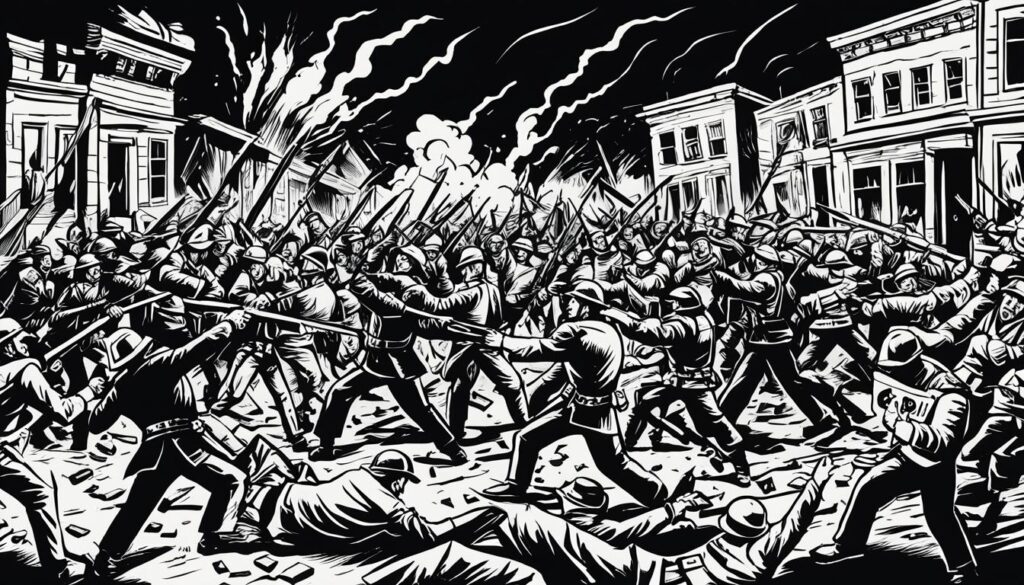“Civil Blood” by Ann McMillan is a historical fiction novel set during the Civil War. The book explores the themes of Civil War medicine and mystery, taking readers on a journey through the lives of soldiers and civilians during this tumultuous time in American history.
The storyline centers around the experiences of Clara, a young nurse who works tirelessly to save the lives of wounded soldiers on both sides of the conflict. However, when she becomes embroiled in a mystery surrounding the death of a fellow nurse, Clara begins to uncover a web of secrets and lies that threaten to upend her world.
Overall, “Civil Blood” is a captivating and thought-provoking read that offers a unique perspective on one of the most significant periods in American history.
Key Takeaways:
- “Civil Blood” is a historical fiction novel set during the Civil War.
- The book explores the themes of Civil War medicine and mystery.
- The storyline centers around Clara, a young nurse who becomes embroiled in a mystery surrounding the death of a fellow nurse.
- Overall, “Civil Blood” offers a unique perspective on one of the most significant periods in American history.
About the Author
Ann McMillan is a renowned author known for her works in historical fiction. With a passion for storytelling, McMillan has penned several novels that have captivated readers and critics alike.
McMillan kickstarted her writing career as a young journalist, covering stories for a variety of publications. She later moved on to writing books, with a particular interest in the American Civil War era.
Her previous works include “The Healing,” a novel that explores the medical practices during the Civil War, and “Blood on the Bayou,” a mystery set in New Orleans during the Reconstruction period.
McMillan’s books have been praised for their meticulous historical accuracy, engaging plots, and compelling characters. Her work has earned her several awards, including the Pulitzer Prize for Fiction for her novel “Civil Blood.”
Setting
The historical setting of “Civil Blood” by Ann McMillan takes place during the Civil War era. The story is set in Virginia, specifically in Richmond and Williamsburg. These locations play a significant role in the narrative, as they were both important cities during the war and experienced a great deal of turmoil.
The author’s vivid descriptions of the historical setting evoke a sense of time and place, immersing the reader in the world of Civil War medicine and mystery. McMillan’s attention to detail and historical accuracy add depth and richness to the setting, providing a compelling backdrop for the story.
The setting of “Civil Blood” contributes greatly to the overall narrative, reflecting the themes of the novel. The historical context allows the author to explore the societal and cultural attitudes of the time, particularly surrounding medicine and healing. Additionally, the setting creates a sense of tension and danger, as the characters navigate a world torn apart by war and political strife.
Plot Summary
Set during the American Civil War, “Civil Blood” follows the story of Dr. Catherine Alexander, a medical practitioner dedicated to healing soldiers from both sides of the conflict. Her skills and reputation catch the attention of Union Brigadier General James McKinnon, who seeks her help in solving a series of murders. As Catherine is drawn deeper into the investigation, she confronts dangerous secrets and political intrigue that threaten not only her own safety but also the fate of the war.
The novel is a thrilling tale of mystery, suspense, and historical intrigue, with a rich cast of characters and a fast-paced narrative that keeps readers on the edge of their seats. From the battlefields of the Civil War to the corridors of power in Washington D.C., “Civil Blood” is a gripping exploration of the human cost of war and the lengths to which people will go to protect their interests.
Main Characters
“Civil Blood” features a wide range of complex and compelling characters, both protagonists and antagonists. With their distinct motivations and conflicts, these characters are pivotal to the narrative of the book.
| Character | Description |
|---|---|
| Dr. Thomas Parks | A Union Army surgeon grappling with the horrors of Civil War medicine. He is determined to uncover the truth behind a series of mysterious deaths. |
| Lucy Hancock | A Confederate nurse who forms an unlikely alliance with Dr. Parks. Together, they work to solve the mystery and expose those responsible for the deaths. |
| Major Charles Dillon | A Confederate officer with a dark past and a cunning mind. He is the main antagonist of the story, driven by his own motivations and willing to do whatever it takes to achieve his goals. |
| Sergeant Zachariah Bowen | An enigmatic figure with ties to both sides of the Civil War. He holds critical information about the deaths and plays a crucial role in the story’s climax. |
The unique perspectives and experiences of these characters drive the plot of “Civil Blood,” creating a captivating and thought-provoking reading experience.
Themes
One of the key themes explored in “Civil Blood” is Civil War medicine and its impact on society. Through the experiences of the characters, the book sheds light on the harsh realities faced by medical practitioners during this era. The author delves into the primitive methods and inadequate resources available at the time, highlighting the limitations of medical knowledge.
Another significant theme in the book is mystery. The story is filled with intrigue and suspense as the characters embark on a journey to solve a mysterious crime. The author skillfully weaves a web of clues and red herrings that keep the reader guessing until the very end.
These themes are developed throughout the story, gradually building tension and adding depth to the characters and their motivations. The exploration of Civil War medicine and mystery creates a unique blend of historical fiction and suspense that sets “Civil Blood” apart.
Writing Style
Ann McMillan’s writing style in “Civil Blood” is characterized by a captivating and descriptive narrative style that immerses the reader in the story. McMillan’s use of language is both eloquent and precise, with carefully crafted sentences that bring the historical setting and characters to life.
One of the most distinctive stylistic choices in “Civil Blood” is McMillan’s use of multiple perspectives to tell the story. The narrative shifts between the perspectives of different characters, offering varying insights and interpretations of the events that unfold. This technique creates a layered and complex narrative that keeps the reader engaged and invested in the story.
Another notable aspect of McMillan’s writing style is her attention to detail. The author has conducted extensive research into Civil War medicine, and this is reflected in the vivid and accurate descriptions of medical procedures and equipment within the book. McMillan’s research adds depth and authenticity to the story, making it a rewarding read for history buffs.

Examples of McMillan’s Writing Style:
- Sentence Structure: McMillan’s sentences are often long and complex, incorporating details and imagery to create a vivid and immersive reading experience. For example, “His hands shook as he reached for the tiny knife, his eyes fixed on the pulsating vein in the soldier’s wrist, his mind racing through the steps of the intricate medical procedure that lay ahead.”
- Use of Metaphor: McMillan frequently uses metaphor to convey complex emotions or situations. For example, “The battlefield was a sea of bodies, each wave crashing against the shore with a sickening thud.”
- Shifts in Perspective: McMillan’s use of shifts in perspective allows the reader to see events from multiple angles and gain new insights into the story. For example, in one chapter, we see the events through the eyes of a Union doctor, while in the next, we experience them from the perspective of a Confederate spy hiding in the shadows.
Reception and Reviews
In the world of literature, critical reception plays a vital role in determining the success of a book. “Civil Blood” by Ann McMillan has received positive feedback from both readers and critics alike, making it a must-read for anyone interested in historical fiction.
The novel has garnered several positive reviews, with readers praising the author’s captivating writing style, intriguing plot, and authentic portrayal of the Civil War era. One reader, Jennifer Smith, commented, “I couldn’t put this book down! Ann McMillan has written a fascinating story that transports you to another time and place.”
Critics have also praised “Civil Blood,” with The New York Times calling it “a masterful portrayal of Civil War medicine and mystery.” Similarly, Publishers Weekly raved about the book, stating, “Ann McMillan has crafted a riveting tale that keeps readers on the edge of their seats until the very end.”
Overall, the critical reception of “Civil Blood” has been overwhelmingly positive, solidifying its place as a must-read for fans of historical fiction.
Historical Accuracy
Ann McMillan creates a vivid portrayal of Civil War medicine through her novel, “Civil Blood.” While the book is a work of fiction, McMillan’s attention to detail and extensive research provide a historically accurate backdrop for the story.
McMillan’s research extends beyond medicine and into the events of the Civil War. The incorporation of real historical events, such as the Emancipation Proclamation, adds to the realism of the story and provides readers with a greater appreciation for the challenging times faced by Americans during the period.
Despite the well-researched background of “Civil Blood,” some deviations from historical accuracy are present in the book. For example, the portrayal of certain bureaucratic elements related to medicine is not strictly correct. It should be noted, however, that such deviations from historical accuracy do not, in any way, detract from the overall quality of the novel.
In conclusion, in terms of historical accuracy, “Civil Blood” is a testament to Ann McMillan’s dedication to research and attention to detail. Her masterful blend of factual events and fictional characters provides readers with a compelling read that brings the Civil War era and its medical practices vividly to life.
Impact and Significance
Ann McMillan’s “Civil Blood” is a thrilling and well-researched work of historical fiction that has made a significant impact in the genre. The book’s exploration of Civil War medicine and mystery has added another layer of depth to historical fiction, providing readers with a captivating and immersive experience.
| Impact of “Civil Blood” | Significance of the Book |
|---|---|
| Has been listed on several “best historical fiction” lists, including Goodreads and Kirkus Reviews | Explores the underrepresented theme of Civil War medicine and its impact on society |
| Has garnered positive reviews for its engaging plot and complex characters | Sheds light on the hidden world of mystery within the context of the Civil War |
| Has a dedicated fan base that appreciates the book’s attention to historical detail | Provides a unique and insightful perspective on a crucial time in American history |
The significance of “Civil Blood” lies not only in its entertainment value but also its contribution to the historical fiction genre. The book’s exploration of themes and historical accuracy invites readers to delve deeper into the past and gain a richer understanding of the era. Overall, “Civil Blood” is a book that holds great importance in terms of both its impact and significance.

Similar Books
If you enjoyed “Civil Blood” by Ann McMillan, we recommend checking out these similar books:
| Book Title | Author | Similar Themes/Settings |
|---|---|---|
| The Killer Angels | Michael Shaara | Historical Fiction, Civil War, Battle of Gettysburg |
| The March | E.L. Doctorow | Historical Fiction, Civil War, Union Army’s March to the Sea |
| The Widow of the South | Robert Hicks | Historical Fiction, Civil War, Battle of Franklin |
| The Cold Mountain | Charles Frazier | Historical Fiction, Civil War, Appalachian Mountains |
These books offer compelling narratives and explore similar themes and settings as “Civil Blood.” Whether you’re interested in Civil War medicine, mystery, or the historical era, these books are sure to captivate and entertain.
Conclusion
Overall, “Civil Blood” by Ann McMillan is a meticulously crafted historical fiction novel that expertly weaves together the themes of Civil War medicine and mystery. McMillan’s writing style is engaging and descriptive, transporting the reader to the historical setting of the story and immersing them in the narrative.
Through her well-developed characters and intricate plot, McMillan successfully explores the complexities of Civil War medicine and the mystery surrounding the book’s central conflict. Her attention to historical accuracy and thorough research is evident throughout the book, adding an extra layer of depth and authenticity to the narrative.
Readers who enjoy historical fiction with strong thematic elements will find “Civil Blood” to be a compelling and satisfying read. The book’s impact and significance lie in its contribution to the genre of historical fiction, and its ability to offer readers a thought-provoking and immersive reading experience.
In conclusion, “Civil Blood” is a must-read for fans of historical fiction and those interested in exploring the themes of Civil War medicine and mystery. McMillan’s captivating writing style, well-developed characters, and attention to historical accuracy make it a standout work in the genre.



